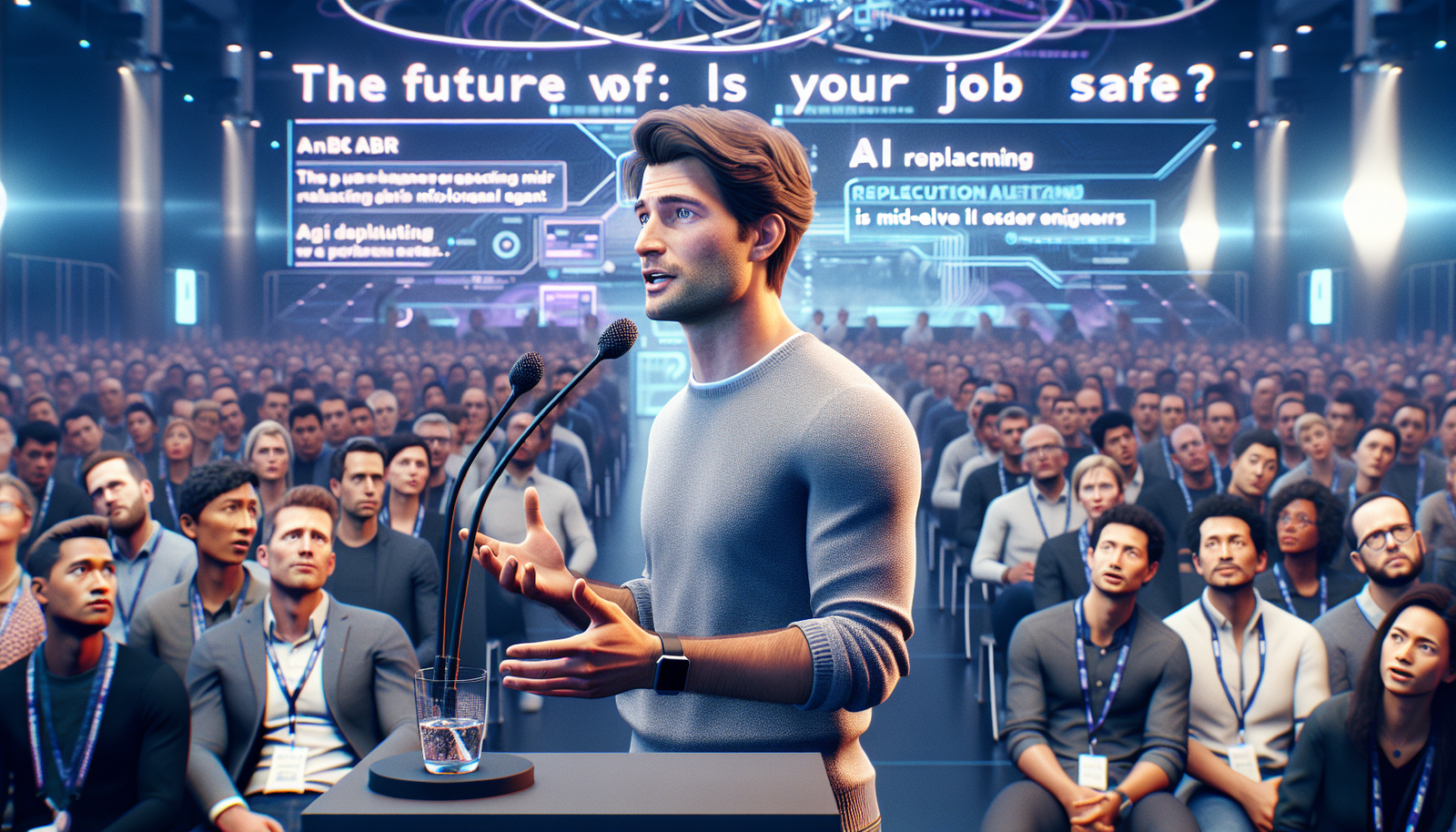Announcement by Mark Zuckerberg
Mark Zuckerberg, in a recent interview, revealed that Meta plans to automate the work of mid-level software engineers as early as this year. This radical change could transform the landscape of technology and employment within the company. According to him, this evolution is part of a broader trend where certain skills, historically valued in the job market, will become fully automated.
Futuristic Vision
Zuckerberg anticipated that by 2025, Meta and other tech giants will have artificial intelligence capable of replacing the skills of a mid-level engineer. This AI would be able to write code, challenging the traditional view of human tasks in software development. Such upheaval raises questions about the future of careers in the tech sector.
Outsourcing Skills
Once this technology is adopted, Meta plans to entrust all programming of its applications to AI. This marks a turning point where previously essential functions could be entirely delegated to machines. As a result, lower-level engineers may struggle to find their place in a work environment saturated with automated solutions.
Evolving Teams
This announcement has accompanied significant changes within Meta. The company has also expressed its intention to replace its third-party evaluators with a community rating system. This choice has raised concerns among fact-checking organizations that see these changes as a risk to the quality and integrity of information.
Reduction in DEI Initiatives
Meta is also committed to reducing its diversity, equity, and inclusion (DEI) initiatives. In a memo addressed to employees, the vice president of human resources indicated that there would no longer be a dedicated team for these issues. This withdrawal could spark debates about the company’s priorities in the age of automation.
Implications for the Job Market
Zuckerberg’s statement has sparked debates about the implications of AI for jobs in the tech sector. While automation could enhance efficiency, it calls into question the sustainability of many positions. Many professionals fear that this evolution could lead to a programmed extinction of their roles.
Reactions to the Announcement
Dissent is being heard among workers in the sector. An open letter signed by activist groups highlights their concerns regarding the direction Meta is taking. They fear that this vision of the future could harm employment and diversity within the company. Such a reaction underscores the need for constructive dialogue regarding the integration of AI into professional practices.
Technological Context
These announcements come at a time when the tech market is undergoing a profound transformation. Other companies like Nvidia continue to impose their vision of an industry dominated by AI. Their recent advancements could well reinforce this observable trend in the sector. Stock markets are also reacting, with the Nasdaq and the S&P 500 significantly rising, partially due to the surge of AI. Technology stocks are soaring.
Conclusion on Automation
With these ongoing developments at Meta, the debate on automation continues to concern experts and observers. The consequences of AI will extend beyond mere organizational changes. The future of work in the tech field will require careful examination. Reflections must be made on how to accompany these changes while preserving human and ethical values.
Frequently Asked Questions About the Impact of AI at Meta
What are the main changes announced by Mark Zuckerberg regarding mid-level engineers at Meta?
Mark Zuckerberg indicated that Meta plans to automate the work of mid-level engineers, with the possibility that all coding will be entrusted to artificial intelligence systems in the near future.
When can we expect this automation to start at Meta?
According to Zuckerberg, the first impacts of this automation could be visible as early as this year, with significant developments expected by 2025.
What types of tasks could be replaced by AI within Meta’s technical team?
The tasks concerned mainly include coding and software development, which could be entirely managed by AI, thus reducing the need for human intervention in these processes.
What will the consequences be for mid-level engineers at Meta in the short term?
Mid-level engineers may face a reduction in job opportunities, with a potential reskilling towards more strategic roles or areas requiring human expertise that is difficult to automate.
Does Meta plan to retain roles related to project management or oversight even after automation?
It is likely that some management and oversight functions will remain necessary, but the exact nature of these roles will depend on the integration and effectiveness of the adopted AI systems.
How might this decision by Meta influence the job market for software engineers elsewhere?
This initiative could trigger a general trend towards automation in other tech companies, which could intensify competition for remaining positions and alter the demand for skills in the job market.
What measures does Meta plan to take to assist with this transition to AI?
Mark Zuckerberg mentioned that, although the transition may be costly initially, the goal is to achieve complete automation of processes, which may include investments in advanced AI technologies.
Are there concerns among Meta employees regarding this automation?
Yes, some employees are concerned about the impact of this decision on employment and team dynamics, especially as it coincides with other changes in the organization of the company.
How will the transition to AI affect the quality of software development at Meta?
There are concerns regarding quality, as while AI may reduce costs and improve efficiency, creative tasks and complex problem-solving remain areas where human intervention is crucial.
What can mid-level engineers do to prepare for this future transition?
Engineers should consider developing skills in project management, data analysis, and familiarizing themselves with AI technologies to remain relevant and navigate this new work environment.






